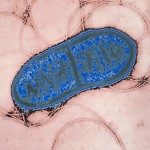Lien vers Pubmed [PMID] – 30905295
Philos. Trans. R. Soc. Lond., B, Biol. Sci. 2019 May;374(1772):20180103
Our bodies are colonized by a complex ecosystem of bacteria, unicellular eukaryotes and their viruses that together play a major role in our health. Over the past few years tools derived from the prokaryotic immune system known as CRISPR-Cas have empowered researchers to modify and study organisms with unprecedented ease and efficiency. Here we discuss how various types of CRISPR-Cas systems can be used to modify the genome of gut microorganisms and bacteriophages. CRISPR-Cas systems can also be delivered to bacterial population and programmed to specifically eliminate members of the microbiome. Finally, engineered CRISPR-Cas systems can be used to control gene expression and modulate the production of metabolites and proteins. Together these tools provide exciting opportunities to investigate the complex interplay between members of the microbiome and our bodies, and present new avenues for the development of drugs that target the microbiome. This article is part of a discussion meeting issue ‘The ecology and evolution of prokaryotic CRISPR-Cas adaptive immune systems’.

